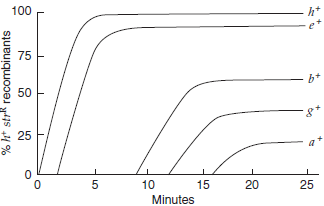
iGenetics 3rd Edition by Peter Russell
Edition 3ISBN: 978-0321569769
iGenetics 3rd Edition by Peter Russell
Edition 3ISBN: 978-0321569769 Exercise 4
At time zero, an Hfr strain ( Hfr 1) was mixed with an F - strain, and at various times after mixing, samples were removed and agitated to separate conjugating cells. The cross may be written as
Hfr 1: a + b + c + d + e + f + g + h + str S
F - : a b c d e f g h str R
(No order is implied in listing the markers.) The samples were then plated onto selective media to measure the frequency of h + str R recombinants that had received certain genes from the Hfr cell. A graph of the number of recombinants against time is shown in the accompanying figure.
a. Indicate whether each of the following statements is true or false:
i. All F + cells that received a + from the Hfr in the chromosome transfer process must also have received b +.
ii. The order of gene transfer from Hfr to F - was a + (first), then g + , then b + , then e + , and, finally, h +.
iii. Most e + str R recombinants are likely to be Hfr cells.
iv. None of the b + str R recombinants plated at 15 minutes are also a +.
b. Draw a linear map of the Hfr chromosome, indicating
i. the point of nicking (the origin) and the direction of DNA transfer.
ii. the order of the genes a + , b + , e + , g + , and h +.
iii. the shortest distance between consecutive genes on the chromosomes.
Hfr 1: a + b + c + d + e + f + g + h + str S
F - : a b c d e f g h str R
(No order is implied in listing the markers.) The samples were then plated onto selective media to measure the frequency of h + str R recombinants that had received certain genes from the Hfr cell. A graph of the number of recombinants against time is shown in the accompanying figure.

a. Indicate whether each of the following statements is true or false:
i. All F + cells that received a + from the Hfr in the chromosome transfer process must also have received b +.
ii. The order of gene transfer from Hfr to F - was a + (first), then g + , then b + , then e + , and, finally, h +.
iii. Most e + str R recombinants are likely to be Hfr cells.
iv. None of the b + str R recombinants plated at 15 minutes are also a +.
b. Draw a linear map of the Hfr chromosome, indicating
i. the point of nicking (the origin) and the direction of DNA transfer.
ii. the order of the genes a + , b + , e + , g + , and h +.
iii. the shortest distance between consecutive genes on the chromosomes.
Explanation
(a) (i)This would be true because the a ...
iGenetics 3rd Edition by Peter Russell
Why don’t you like this exercise?
Other Minimum 8 character and maximum 255 character
Character 255


